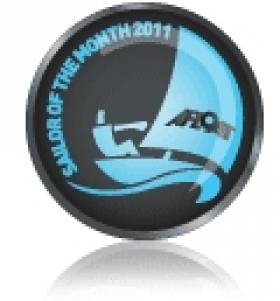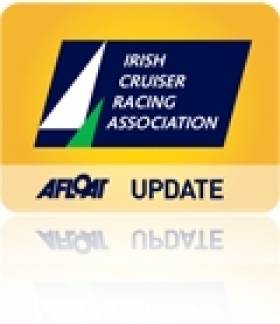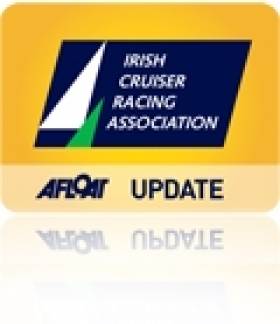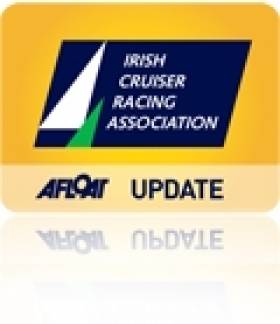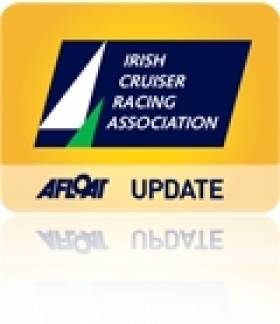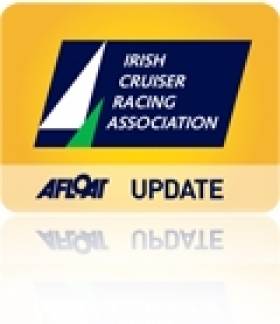Displaying items by tag: Racer
Pat Kelly is Afloat's Sailor of the Month for November
#SAILOR OF THE MONTH – Pat Kelly of Rush Sailing Club is the Afloat.ie/Irish Independent "Sailor of the Month" for November after his J/109 Storm - crewed by fellow-Fingallions - was celebrated as the Irish Cruiser Racer Association "Boat of the Year" at the ICRA annual general meeting in Dun Laoghaire at the weekend.
The sailors of north Fingal are on a roll these days. Back in September, Matt Davis of Skerries won our monthly award after his Sigma 400 Raging Bull retained the Irish Sea offshore championship. And another Skerries sailor, windsurfer Oisin van Gelderen, continues to be Ireland's fastest man afloat, his current official best speed being 44.23 knots.
Now it's the turn of Rush to top the podium. Not that Rush is new to successful sailing. Once upon a time, it was the top port on the east coast of Ireland for smugglers who veered into privateering and occasionally even piracy. To succeed in any of these activities, they needed fast ships and able skippers, and captains like Luke Ryan and James Mathews gave Rush its formidable sailing reputation.

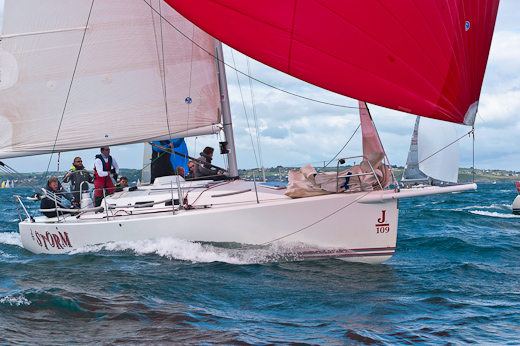
Storm was made ICRA Boat of the year last weekend and this Saturday her skipper Pat Kelly becomes Sailor of the month for November. Photos: Bob Bateman
Highlight of Pat Kelly's season with Storm was his outright class win in the ICRA Nationals at Crosshaven. Five wins in six races is the sort of performance that would get the Luke Ryan/James Mathews seal of approval. Storm was also regularly in the frame in many other major events, and had frequent success in regattas and club racing with a dedication to sailing that does her skipper and crew proud.
Pat kept his previous 30-footer in the tide-riven anchorage at Rogerstown off Rush SC's attractive south-facing clubhouse, one of the few south-facing sailing clubhouses in the entire country. However, with the bigger boat it was necessary to find a berth at Howth, and in fact Storm sails as a joint HYC/RSC entry. But the club in Howth wouldn't begrudge this success to their smaller neighbours to the north. And with their own marina in fine shape (it hosts next year's ICRA Nationals in late May), they'd be the first to agree that the only thing holding back north Fingal sailing from even greater achievements is the lack of sheltered and conveniently accessible pontoon berthing on the entire coast between Malahide and Carlingford Lough.
More from WM Nixon in the Irish Independent here
Howth Plans Big Event for 2012 ICRA Nationals
ICRA – the 2011 Club of the Year – laid out its stall until 2014 at the eighth annual conference in Dun Laoghaire at the weekend and the momentum is already building at Howth Yacht Club (HYC) who stage the 2012 National Championships at the beginning of next season.
The country's biggest yacht club has a potential sponsor in the wings and Saturday's conference also heard from the Club's Norbert Reilly that HYC is adding feeder events around the two day championships from May 25/27 to double the attraction of the North Dublin venue.
The Corby Cup will be sailed the weekend prior to the Nationals (19-20 May) and the Irish sea offshore body, ISORA, will stage a feeder race from Conwy in Wales to Howth. Both initiatives will encourage UK boats to travel to Dublin for the ICRA series.
Typically the ICRA event attracts over 100 boats in four different classes.
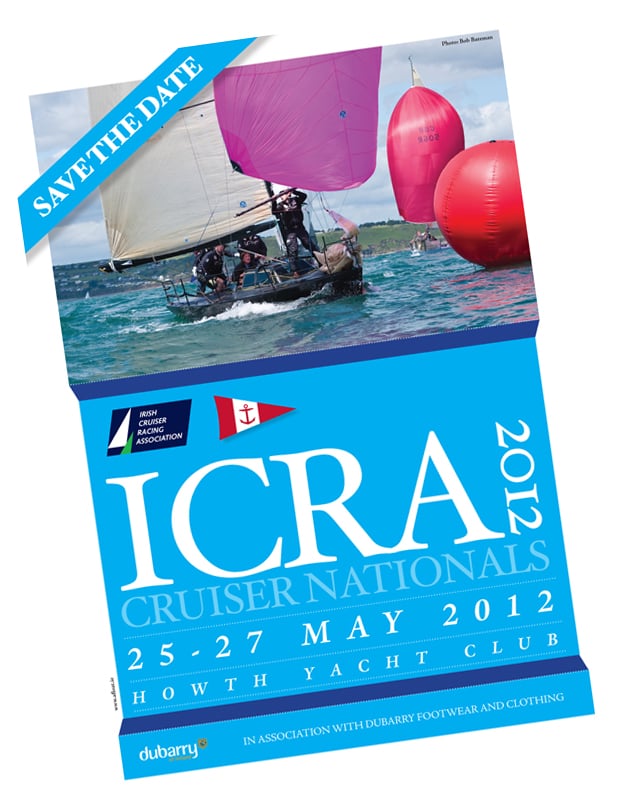
In spite of a dip in the size of the Cruiser fleet in Howth in recent years local boats are still taking some of the big prizes nationally with Reilly's Crazy Horse the 2011 Volvo Dun Laoghaire and DBSC Cruiser Challenge winner and Pat Kelly's J109 Storm picking up the weekend conference's top 'Boat of the Year' prize.
Ashore there are plans to make the event family oriented and a 'ladies lunch' is also planned.
The weekend's ICRA conference decided to do away with the crew limit rule for the seven race series in Howth as the association focuses on getting more crews out on the water to enjoy cruiser racing.
The ICRA Nationals goes West for a return visit to Tralee Bay Sailing Club in June 2013 and in 2014 the National Championships will be staged by the Royal Irish Yacht Club in Dun Laoghaire.
In the normal cycle of things 'the ICRAs' should be heading to the south coast again in 2015 but so far, the conference heard, the association is open to offers.
The 2012 ICRA Notice of Race for the Howth Championships will be available on Afloat.ie shortly
Offshore Fixture Clash to be Aired at ICRA Conference
#ICRA – Next weekend's agenda for the Irish Cruiser Racer Association (ICRA) meet in Dun Laoghaire will discuss a clash of offshore fixtures following the news that a new 600–mile race from Galway, the Round Rockall race on June 24th is to run on the same weekend as the biennial Round Ireland race from Wicklow.
ICRA's full agenda for next Saturday's meeting at the Royal Marine hotel is below:
· ANNUAL REPORT – BARRY ROSE, COMMODORE ICRADiscussion on the current state of cruiser racing and cruiser classes' breakpoints
· MEMBERSHIP OF ICRA AND ITS COMMITTEES
· PREVIEW ICRA CHAMPIONSHIPS 2012 – HOWTH YC, 25-27 MAY
Draft copy of NoR may be circulated before conference.
· VENUES FOR FUTURE CHAMPIONSHIPS
2013 – Tralee BSC. 2014 - RIYC
· DISCUSSION ON 'COURSES FOR CRUISERS' – with leading race officers in attendance
It is envisaged that this will be one of the major items for discussion
· COMMODORES' CUP 2012
Selection process and promotion of Corinthian/academy team
· RATING & HANDICAPING – REPORT/S FROM IRC OWNERS CONGRESS
· CALENDAR OF MAJOR EVENTS
The Round Ireland/Rockall clash – is it necessary?
· PROMOTION OF OFFSHORE SAILING
· NON-SPINNAKER DEVELOPMENTS
· 'BOAT OF THE YEAR' PRESENTATION
Nominees welcomed
AOB
ICRA Seek Team for Defence of 2012 Commodore's Cup
The Irish Cruiser Racing Association (ICRA) is seeking expressions of interest from owners to form an Irish team to defend the Rolex Commodore's Cup next July.
ICRA Commodore Barry Rose says that despite the current difficult environment ICRA remains hopeful of mounting a serious defence and have waited until now to allow the maximum time to those who may consider supporting the challenge.
The Rolex Commodores Cup takes place from 21st to 28th July 2012 based in Cowes. Ireland first won this prestigious International Trophy in 2010 .
Captain of the winning team Anthony O Leary told Afloat.ie: 'We finally won this great event in 2010 with a well organised campaign. Let's hope we
can return to defend it in 2012 learning further from that experience'
The regatta format has been changed by event organisers the RORC in that the smallest boat will now have a minimum rating of 1.020 with the biggest boat maximum rating of 1.230. There will be only one boat per team allowed to rate in excess of 1.150.
This means there will no longer be three separate classes so all starts will be all in which will add to the excitement and spectacle of the event.
Countries will be free to decide on their own combination of boat sizes within the above bands which will add further to the intrigue of this non discard seven day test of inshore and offshore racing.
ICRA is asking for potential interested owners to make contact with them as soon as possible in order that a meeting can be held within the next month to advance ideas on how best to mount a successful defence.
Cruiser Racers Head for Royal Cork
Simon McGibney of WIORA confirmed there are already at least 15 boats interested in travelling to the event to join with the Cork, Kinsale and East coast boats. There is also the tantalising prospect of the fleet being joined by no less than ten quarter tonners from the UK who also plan to sail in the Sovereign's Cup at Kinsale the following week. Most of these British boats are crewed by professionals and will race with the Irish Class three fleet. They will, however, be scored separately and will receive a separate trophy.
Sailing with the Quarter Ton fleet will be Anchor Challenge, beautifully restored and modified by former owner Peter Morton, and now in the ownership of Eamon Rohan. At the weekend our spy spotted an all white gleaming boat wending its way up the Kinsale Road and wondered could this possibly have been Anchor Challenge and, if so, will we see a battle between the all black Tiger and the all white newcomer??
For the duration of the ICRA National Championships there will be subsidised launching at Ringaskiddy for all trailerable boats. In addition a very attractive accommodation package has been arranged for all ICRA competitors at the Carrigaline Court Hotel. They are offering three nights B/B plus one evening dinner from Thursday to Saturday and free B/B for Sunday night at €129 per person sharing.
A crew list has been set up by RCYC for skippers wishing to acquire crews with local knowledge and Race Officers for the event will be the hugely experienced Peter Crowley and Richard Leonard.
ICRA Commodore Barry Rose was delighted to inform the meeting that Yacht Designer Mark Mills has joined the ICRA committee where his expertise and wide knowledge will be greatly appreciated. Mark gave a most interesting report on recent developments re racing matters. One item referred to the fact that boats with bulb keels will now be more severely rated and another item of interest is discussion going on with regard to changing the rating bands for the 2012 Commodores Cup. It is believed there is a move afoot to lower the bands i.e. the current middle rated boat may be the big boat for the 2012 event.
New Trailerable 30 Footer to be Unveiled at ICRA Conference
Commodore Barry Rose is urging Cruiser Racers fans to support this weekend's eighth annual ICRA conference at the Carrigaline Court hotel in Carragaline, County Cork.
There's a big line up for the one day event that includes a presentation on an innovative concept to develop a 30 Footer one design concept that can also sail under IRC handicap. The idea is that it will be trailerable to attend ICRA Nationals and other events around Ireland. Rory Staunton travels from the UK to make the 30 footer presentation.
Rose says Saturday's event gives an opportunity to exchange 'constructive opinions to promote and develop the cruiser/racing', the biggest sector of Irish Sailing.
The event includes a celebration dinner for the Commodores Cup team at the Royal Cork Yacht Club.
Designers John Corby and Mark Mills will be present to update us on IRC developments and boat design and their thoughts on where boat design is heading. More HERE



























